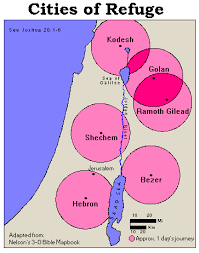Cities of Refuge
35: 9-34

Six of the Levitical cities were designated as cities of refuge. In Deuteronomy 4:43, three of the six cities of refuge are listed: Bezer in the tribe of Reuben, Ramoth in the tribe of Gad, and Golan in the tribe of Manasseh. Moses established those three on the eastern side of the Jordan River among the already conquered territories. Then, in Deuteronomy 19:1-2, he commanded Isra’el to establish three more on the western side of the Jordan River once they conquered it. Moshe said: When ADONAI your God cuts off the nations whose land ADONAI your God is giving you, and you take their place and settle in their cities and houses, you are to set aside three cities for yourselves in your land that ADONAI your God is giving you to possess. Therefore, once Canaan was conquered, three more cities of refuge were established: Kedesh in the tribe of Naphtali, Shechem in the highlands of Samaria on the border between Ephraim and Manasseh, and Hebron in the central hill country of Judah.777 As you can see from the map above, those cities of refuge were so strategically located that nobody who needed to flee for refuge would be too far away from an appointed city.
The nation of Isra’el had an army, but it didn’t have anything close to our modern police system. If somebody was murdered, the members of the victim’s family and clan saw to it that the murderer paid for his crime with his life. He was not eligible to flee to a city of refuge (see Gl – Those Not Qualified to Flee to a City of Refuge), and was taken back to the city where his crime was committed to be stoned to death. Murder was a capital crime in Isra’el for which there was no ransom (35:32). The blood of the innocent victims polluted the Land, and the Land belongs to ADONAI (Genesis 4:10 and 9:5). The only way the Land could be cleansed was by the death of the murderer (Genesis 9:6). However, if a man accidentally killed someone, that was a case of manslaughter; not murder, and it would have been wrong to make him pay with his life. He could flee to a city of refuge (see Gm – Those Qualified to Flee to a City of Refuge). The elders allowed him to stay there under their protection until the death of the high priest. Then he was free to return home. He was not allowed to pay a ransom and be freed sooner (Numbers 35:32).778



Leave A Comment